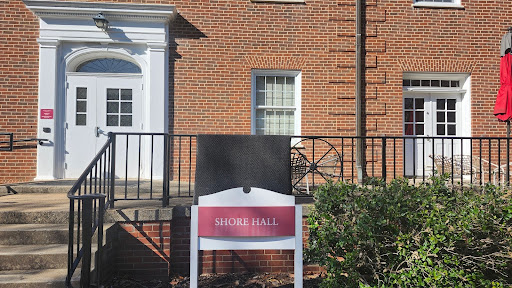On Sept. 25, Dana Auditorium overflowed with students, staff and alum to discuss the new Administrative Program and Services Assessment report.
“This institution has some really tough years ahead financially,” said Associate Professor of Business Management Betty Kane. “There are going to have to be some major structural changes.”
In light of this, the report focused on the financial feasibility of Guilford’s programs and services.
“We spend so little money on staff compared to our peers with similar size endowments, debt, etc.,” said Associate Professor of Political Science Maria Rosales. “Yet most recommendations cut staff.”
Other report recommendations added strain on Guilford faculty.
“If we separate CCE, think about what would happen to the staff and the numbers it can’t support when 1,000 students are separated out,” said Associate Vice President and Dean for Continuing Education Rita Serotkin.
Another program targeted for reductions is The Early College program should negotiations fail to produce a more profitable contract.
Professor of Music Timothy Lindeman advocated negotiations with Guilford County schools.
“What a loss it would be, both to Guilford College and the departments with an immense number of Early College students, to lose that young student body,” said Lindeman.
These recommendations are causing CCE, ECG and traditional students alike to feel disconnected from this process.
“We’re feeling shut out from this,” said senior Daniel Raeder. “I hope (the committee) will take that into consideration. There’s the data-driven, but where’s the student-driven aspect of this?”
Another program defended by attendees was the Art Gallery.
“I witnessed huge turn-out, great student learning, great student engagement,” said Associate Professor of Religious Studies Eric Mortensen of Art Gallery events. “Therefore, how did (the committee) conclude it has minimal impact on student life?”
Visiting Assistant Professor of Peace and Conflict Studies Jeremy Rinker also voiced concern regarding the valuation’s criteria.
“I heard ‘qualitative’ and ‘quantitative’ data-driven approaches, but I get the impression the report is very much quantitative and not qualitative,” said Rinker.
The Bonner Center raised a stir at the forum, too.
“Through the Bonner Center, a goodwill and connection to the Greensboro community is created,” said Professor of Philosophy Lisa McLeod. “I’m not sure how you would quantify or qualify that goodwill, but I encourage (the committee) to find someone who knows how.”
Many students felt that the APSA committee’s recommendations disregarded Guilford’s core values.
“The Multicultural and Quaker departments are very close to the inner-light,” said senior Noel Lane. “That’s why I came to Guilford. If there are other students who came here for the same reason, how will this affect retention rates?”
Other attendees spoke out about preserving some of the school’s most treasured programs.
“In the report the importance of community is acknowledged, and I think that’s something that is lacking from this report,” said sophomore John Madden. “I feel like the programs under scrutiny are the loudest and most vibrant programs here on campus.”
The students expressed the importance of such programs to Guilford’s fundamentals.
“The core of liberal arts education is undercut by the recommendations,” said sophomore Noel McDonald. “Why are you choosing to eliminate or cut programs like Bonner, Multicultural education, the Friends Center, but programs like athletics are being maintained?”
Committee member and Vice President for Administration Jon Varnell reminded attendees that the committee could only listen to their suggestions.
“There’s nobody here on this panel, in this group, that can respond,” said Varnell. “The only thing we can do is help clarify and restate.”
Varnell, along with the rest of the committee, will consider all feedback and revise the report before sending it to President Kent Chabotar.
Chabotar, who also attended the forum, reminded attendees of their last opportunity for recommendations on the report.
“By Oct. 4 APSA feedback is needed,” said Chabotar. “Sometime around fall break I will get the report … you’ll come back and there will be no APSA recommendations.”
[photomosaic nggid=158]











